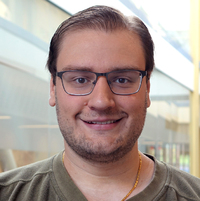
Kevin Joseph Leach
Sony Building, 4110 — Vanderbilt University
kevin.leach@vanderbilt.edu
Prospective students and postdocs
I am not currently recruiting students. However, if you are interested in leading research projects across artificial intelligence, cybersecurity, or software engineering, please send me an email with your CV.
If you are a Computer Science graduate student looking for advice on the job market, please see the CS Grad Job Guide to which I have contributed.
Bio
I am an Assistant Professor of Computer Science at Vanderbilt University. Previously, I was a Senior Research Fellow in the Computer Science and Engineering Division at the University of Michigan—Ann Arbor, where I was engaged in a variety of research spanning security, software engineering, and artificial intelligence. Prior to UM, I was a Research Scientist in the Robust Low Power VLSI group at the University of Virginia. I received my PhD in Computer Engineering at the University of Virginia under the guidance of Wes Weimer. I work across a variety of disciplines, including systems security, software engineering, and robust artificial intelligence.
I received my MS in Computer Science at George Mason University in 2013. My advisor was Angelos Stavrou. I received my BS with Distinction in Computer Engineering and Computer Science from the University of Virginia in 2011.
Spring 2026
I am teaching CS6380 - Principles of Computer Security Research during the Spring 2026 semester. You should totally take this course. Course website.
This course is a permanent version of my previously-offered CS8395 - Topics in Computer Security course. This is a graduate-level seminar-like course that covers recent computer security research. It will cover a variety of topics, from malware analysis to machine learning security, botnets, autonomous vehicle security, trusted execution environments, virtual machines and containerization, and large language models. There are no prerequisites for this course, although you will need to use a virtual machine to complete the assignments. That said, the primary goal of this course is to help new graduate students understand how to conduct research, especially for the PhD degree, thus there is a large focus on reading, presenting, and discussing research papers.
-->Fall 25: CS4288 - Web Systems — Course website.
Spring 25: CS6380 - Principles of Computer Security Research — Course website — Student reviews.
Fall 24: CS3276 - Compilers — Course website — Student reviews.
Spring 24: CS8395 - Topics in Computer Security — Course website — Student reviews.
Fall 23: CS3276 - Compilers — Course website — Student reviews.
Spring 23: CS8395 - Topics in Computer Security — Course website — Student reviews.
Fall 22: CS3276 - Compiler Construction— Course website — Student reviews.
Spring 22: CS8395 - Topics in Computer Security — Course website — Student reviews.
Previous Teaching at UM
Winter 2021: EECS 481 — Software Engineering.
Fall 2020: EECS 481 — Software Engineering and EECS 484 — Databases.
Summer 2020: EECS 485 — Web Systems.
Spring 2020: EECS 481 — Software Engineering.
Winter 2020: EECS 498 — Conversational AI.
Fall 2019: I helped teach EECS 498 — Conversational AI.
Winter 2019: EECS 370 — Computer Organization.
Winter 2018: EECS 483 — Compiler Construction.
Milestones at a Glance
- June 2024 — I received an ARPA-H award ($2,000,000) to develop automated binary analysis and patching techniques for medical device firmware (with James Weimer, Baris Kasikci). In press.
- May 2024 — I have been invited again to visit the Air Force Research Laboratory this summer.
- September 2023 — I received an NSA grant ($750,000) to study classification of malware with neural networks (with Taylor Johnson).
- September 2023 — Along with several VU faculty and industrial researchers, our team has received a DARPA grant to build infrastructure for testing autonomous network security agents.
- September 2023 — I received an NSF SaTC EDU grant ($500,000) to develop a middle school robotics and security curriculum in Tennessee (along with Akos Ledeczi and Corey E Brady).
- June 2023 — I received a Seeding Success grant ($120,000) to develop infrastructure for using conversational AI agents to support mental health.
- May 2023 — I have been invited to serve as a Visiting Scientist with the Air Force Research Laboratory this summer with the Griffis Institute.
- April 2023 — I received an Amazon Research Award to support our group's efforts to improve robustness in document classification.
- January 2022 — I have accepted a tenure-track Assistant Professorship at Vanderbilt University.
- September 2017 — I accepted a Senior Research Fellow position at the University of Michigan in Ann Arbor.
- December 2016 — I successfully defended my doctoral dissertation.
- April 2016 — I received the Louis T. Rader Graduate Research Award.
- May 2015 — I successfully defended my dissertation proposal.
- August 2014 — I successfully passed my Qualifying Exam.
- January 2014 — I received an $81k grant from MIT Lincoln Laboaratory to support my PhD research.
- May 2013 — I received my MS in Computer Science from George Mason University